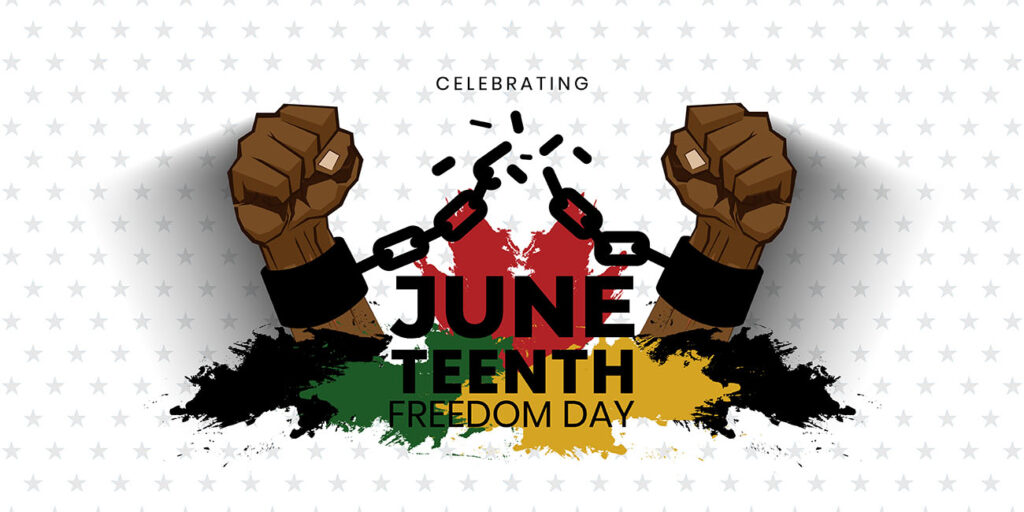“The emancipation of enslaved Black Americans was not the end of our Nation’s work to deliver on the promise of equality — it was only the beginning. On Juneteenth, we recommit to our shared work to ensure racial justice, equity, and equality in America. We commemorate the centuries of struggle and progress led by abolitionists, educators, civil rights advocates, lawyers, activists, trade unionists, religious leaders, public officials, and everyday Americans who have brought our Nation closer to fulfilling its promise.” – President Joe Biden, June 17, 2022
Juneteenth, also known as “June Nineteenth,” holds a profound cultural significance within the Black community. It represents the moment when federal troops descended upon Galveston, Texas in 1865, seizing control of the state and proclaiming the liberation of all those ensnared in the chains of slavery. It is crucial to recognize that this momentous occasion transpired a staggering two and a half years after the Emancipation Proclamation had been inked.
Juneteenth stands as a testament to the enduring spirit and resilience of African Americans, serving as the oldest African American holiday to this day.
Juneteenth’s Historical Significance
The state of Texas holds a strong connection to the tale of Juneteenth and the deeply rooted history of slavery. While the surrender of Confederate General Robert E. Lee at Appomattox Court House had marked a turning point in Virginia, Texas remained untouched by the winds of change. Slavery persisted there, and countless oppressors from distant lands sought refuge in the Lone Star State, perceiving it as a sanctuary for their deplorable institution.
It was not until the spring of 1865, when General Granger set foot on Texas soil and issued General Order No. 3, that the tide began to shift. In those powerful words, the people of Texas were informed that, in accordance with the proclamation of the Executive of the United States, every single soul enchained was now unshackled. However, we must acknowledge the painful truth that the Emancipation Proclamation, proclaimed by President Abraham Lincoln on January 1, 1863, did not instantly bring freedom to all those held in bondage.
Its reach extended solely to areas under Confederate control, leaving slave-holding border states and rebellious territories under Union dominion unaffected. Nonetheless, as Northern troops pressed onward into the Confederate South, hope emerged, leading many enslaved individuals to seek refuge behind Union lines.
With the cessation of the war, the arrival of General Granger in Galveston during that fateful June of 1865 brought forth the dawning of freedom for Texas’s quarter-million enslaved souls. Though emancipation did not manifest overnight for everyone, as some cunning oppressors withheld the news until after the harvest season, it sparked a wave of exultation among the newly liberated Black populace, giving birth to Juneteenth. It is important to note that it wasn’t until December of that year, with the adoption of the 13th Amendment, that the chains of slavery were formally shattered across the entire nation.
Jubilee Day
In the year following 1865, freedmen within Texas organized the inaugural “Jubilee Day” festivities, an annual celebration held on June 19. These commemorative gatherings, rich with the tapestry of our heritage, became a cherished tradition over the ensuing decades. They overflowed with the resounding rhythms of music, the aroma of barbecues wafting through the air, the solace of prayer services, and a kaleidoscope of other joyous activities. As Black individuals migrated from the heart of Texas to other corners of this vast nation, the tradition of Juneteenth traveled alongside them, weaving its threads into the fabric of our shared cultural tapestry.
In a groundbreaking milestone, the great state of Texas blazed a trail by officially designating Juneteenth as a state holiday in 1979, paving the way for other states to follow suit in the years that followed. Finally, in June 2021, the United States Congress, cognizant of the enduring significance of Juneteenth, passed a resolution proclaiming it a federal holiday.
A testament to the long-fought struggle for freedom and equality, this historic legislation was signed into law by President Biden on June 17, 2021. Let us embrace this monumental moment in history, recognizing Juneteenth as a day of remembrance, reflection, and jubilation, as we honor our ancestors and celebrate the profound impact of our collective journey.






